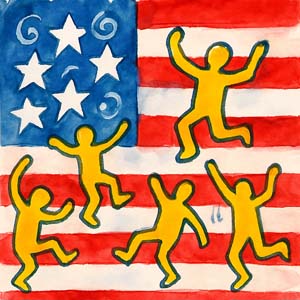O’er the land of the free and the home of the brave!”
— Francis Scott Key
 Born on this day in western Maryland, Francis Scott Key (1779–1843) was a Washington lawyer, devout Christian, and writer. But it was his moment of poetic clarity—during one of America’s darkest hours—that immortalized him in the heart of a nation.
Born on this day in western Maryland, Francis Scott Key (1779–1843) was a Washington lawyer, devout Christian, and writer. But it was his moment of poetic clarity—during one of America’s darkest hours—that immortalized him in the heart of a nation.
As British warships unleashed a relentless 25-hour bombardment on Fort McHenry during the War of 1812, Key watched from a nearby vessel. When dawn broke and the American flag still waved defiantly above the battered fort, emotion overwhelmed him. He penned the anthem’s words on the back of a letter—lines that would stir millions for generations to come.
“And this be our motto,” he wrote. “In God is our trust!”
Set to the British drinking tune To Anacreon in Heaven, “The Star-Spangled Banner” rose alongside Yankee Doodle in early national popularity. In 1916, President Woodrow Wilson ordered the song to be played at all military ceremonies. It was officially declared the national anthem in 1931.
The Smithsonian Institution’s Lawrence M. Small reflected, “It bears witness to America’s indomitable spirit and underscores the historic resilience of our national character.”
Author Margaret Sedeen added, “Every wave of the flag is a pulse of history.” That flag, stitched with sacrifice and belief, continues to fly through war and peace, hope and change.
Key’s anthem is more than music. It’s a declaration of hope, a testament to love of country, and an enduring call to rise with courage. It reminds us that liberty isn’t passive—it is sung, fought for, and held high.
“Blest with vict’ry and peace, may the heav’n-rescued land
Praise the Pow’r that hath made and preserv’d us a nation!”
 Let your pride unfurl.❤️🤍💙
Let your pride unfurl.❤️🤍💙
